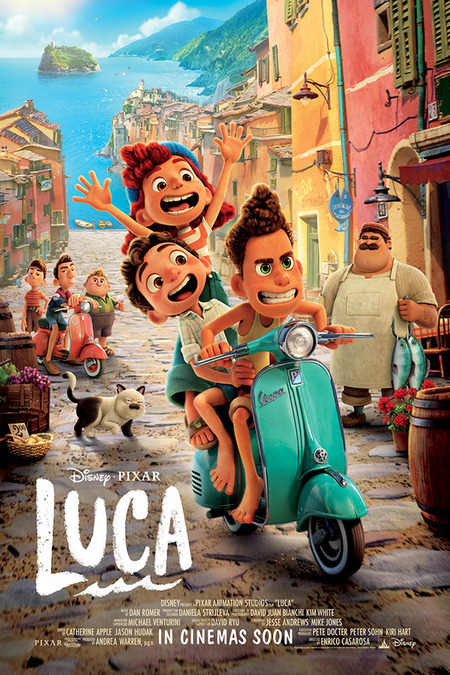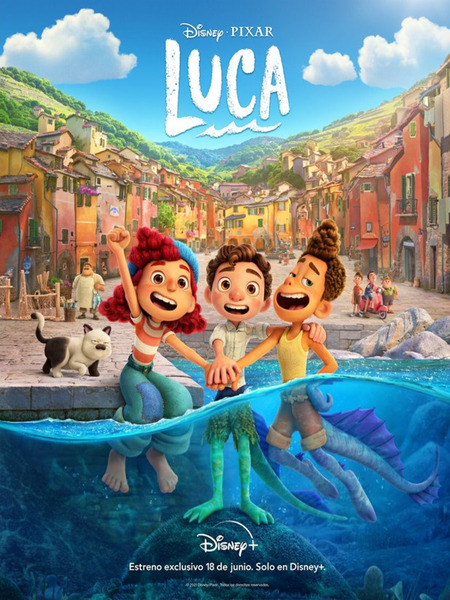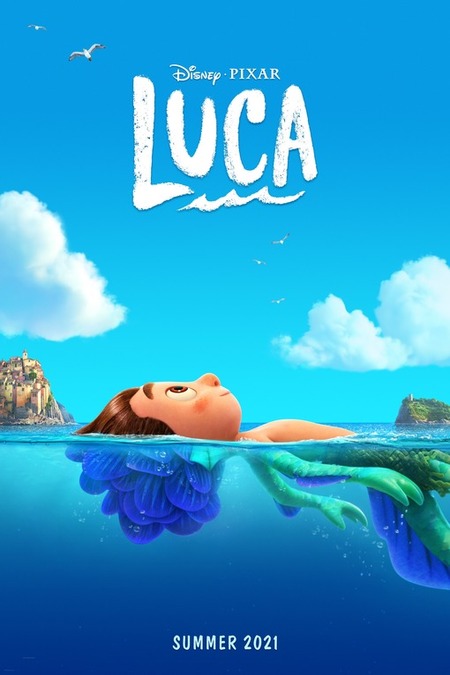If you were ever bullied at school for not fitting in, you will be painfully familiar with the peculiar pain that comes from being singled out as different.
Even if you love who you are, that kind of sustained negative barrage, especially one borne from unthinking bigotry, can have an effect on you, sapping your soul until you begin to wonder if your attackers are perhaps a little bit right, after all.
Thankfully, while it is not a panacea for hatefully exclusionary views, Pixar’s latest animated gem, helmed in his feature-length directorial debut by Enrico Casarosa, Luca, looks this kind of thoughtless cruelty in the eyes and demands that being different be seen as less a liability (for it is surely not that) but more of a, well, difference, rich in its own qualities and possibilities.
Being a Pixar film, of course, it does so in a way that touches your heart, enriches your soul and gets you thinking about why we pillory difference so much in the first place; after all, as Luca demonstrates more than once, there is often far more than unites us than separates us.
That might seem like one of those hoary clichés that are trotted out by well-meaning people looking to make a slogan-bolstered point, but in this gem of an animated outing, it is a shot right to the soul of who we are and who we want to be, realised with exuberance, astonishing use of colour and a celebration of the very best angels of our nature.
Set in the timeless Italian fishing village of Portorosso which looks it well could have Sophia Loren saunter through it in her insouciant prime, scarf on head, whimsical happiness well in hand, Luca tells the story of its eponymous protagonist, a young sea monster boy who dreams of more than herding very stupid goatfish from his undersea home to kelp grazing beds nearby.
It is no an awful life, with Pixar going to its usual effort to craft a world that feels imaginatively real and possible – the sea monsters, which the myopic villagers of Portorosso fear as demons from the deep, spend their days harvesting seaweed, herding fish and sleeping, god bless the creators of Luca, on kelp beds (boom tish) – but Luca wants more, much more, and finds himself toying with the idea of going to the forbidden surface to see if what his parents, Daniela and Lorenzo Paguro (Maya Rudolph and Jim Gaffigan), really say about it is true.
In the course of flirting with the idea of going above the waves, he meets Alberto Scorfano (Jack Dylan Glazer), a fellow sea monster boy who hasn’t just gone to the surface but crafted a life for himself in a broken down stone tower outside of tower which he has filled with all kinds of wonders from the world of man such as Alberto’s delightfully-named Magic Singing Lady Machine aka gramophone.
Alberto is a one-man PR machine for the surface, vivaciously telling a wide-eyed Luca that all the best things are above such as the sky, clouds, gravity and air, though you soon get the feeling that for all his enthusiasm, Luca’s accomplished new friend might have achieved more in word than he actually has indeed.
No matter, though, because his fierce excitement about the outside world awakens a wanderlust in Luca that sees him not only spend increasing amounts of time on land, all without his parents’ knowledge but the tacit approval of his bend-the-rules grandmother (Sandy Martin) but become so human – fortunately once they hit land sea monsters automatically turn human though water, any water from rain to splashed glasses at dinnertime trigger a reversion to their natural form – that he befriends a local girl, Giulia Marcovaldo (Emma Berman), who loves learning and is exuberantly independent and self-assured, and her father Massimo (Marco Barrocelli) and makes plans to enter and win the Portorosso Cup Race in the hopes they can afford to buy a Vespa.
Their love of Vespas is a joy to behold, as much about the classic Italian mode of transportation itself as it is what it represents – the chance to have the freedom to explore a world which is looking all the more exciting all the time.
Luca and Alberto’s joy in this regard is infectious, as is their ebullient friendship with Giulia, who is a kindred spirit in a thousand different ways though even she is not privy to who the two young sea monster boys really are.
A recurrent theme in the film is the boy’s unwillingness to test whether people they come to know and love, such as Giulia and Massimo, will embrace who their two new young friends really are.
Their fear of being discovered, in a village full of murderous folklore and suspicion and a bounty for killing sea monsters, is real and much of the ready humour in the film comes from their desperate fear of not being found out, something that comes close to happening over and over, fuelling some brilliantly funny scenes of visual slapstick that are worth the price of admission alone.
Take the scene where they are first introduced to Massimo, a towering muscle of a man who is far more fearsome in appearance than he is in actuality; as he stands chopping off fish heads, causing the boys to gulp in understandable nervousness, a glass of water is spilled, causing Alberto and Luca to go all sea monster-y, something that is only noticed by the family cat who thereafter goes after that, rather comically, at every opportunity.
Luca is, like many Pixar films, a transcendent mix of the hilarious and the thoughtful, the comedic and the moving, and like its stablemates, the film deftly segues between the two elements without once missing a beat.
Even in the great climactic scene where everything is revealed – not a spoiler; the entire premise of the film and its affectingly honest and real message rests on everyone seeing the boys in their authentic form – Luca moves effortlessly with great warmth and hilarity between stirring your heart, stoking your soul and tickling your funny bone with the verve of a truly great comedian.
This is film that wears it heart cleverly on its sleeve and which celebrates its message of openness, understanding and inclusivity with a naturalness that takes you gleefully and joyfully along for the ride, happy to spend time with Luca who, though he might be fired by the naivety of youth, has a knack for finding the very best people to call his friends.
It is these friends, in the end, who unite the two worlds of the deep and the land, but bringing even more emotional resonance to the film is the delightful bromance that develops between Luca and Alberto who come to mean the world to each other, transforming both their lives for the better in the process.
Luca is an unqualified gem, a gloriously good piece of heartfelt animated storytelling which happily exhorts us to “Silencio Bruno!” (tell our inner critic or voice of enervating caution to shut up), which holds thoughtful understanding of the importance and richness of difference up high and which does it all with a vivacity of visual style, rich characterisation and sparkling narrative that will leave you smiling for days after you have had the pleasure of seeing it.
Luca is currently screening, at no extra charge, on Disney Plus.


